Aug 2016 1st Edition
Aug 2016 1st Edition Estelle Greeff
Translations
SA gaining ground in AIDS fight
SA gaining ground in AIDS fight lebangSouth Africa is set to launch a ground-breaking Antibody Mediated Prevention (AMP) vaccine trail.
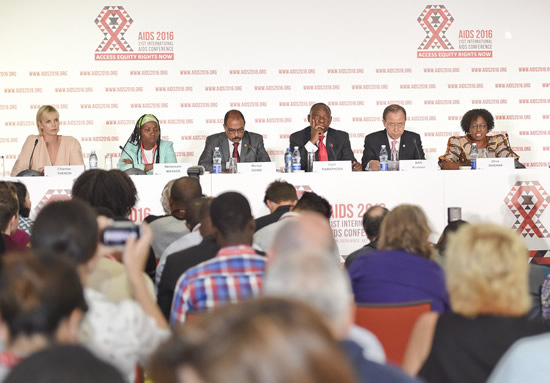 “This is the most important vaccine trial in seven years that will happen on South African soil led by South African scientists at the Medical Research Council,” said South African National Aids Council CEO Dr Fareed Abdullah.
“This is the most important vaccine trial in seven years that will happen on South African soil led by South African scientists at the Medical Research Council,” said South African National Aids Council CEO Dr Fareed Abdullah.
The AMP study is a new idea for HIV prevention that is related to what has been done in HIV vaccine research. In traditional HIV vaccine studies, people are given a vaccine and researchers wait to see if their bodies will make the antibodies against HIV in
response. In the AMP study, however, researchers give people the antibodies directly.
Reacting to the announcement, Health Minister Dr Aaron Motsoaledi said South Africans should welcome any initiative aimed at finding an effective HIV vaccine.
Speaking to Vuk’uzenzele at the 21st International Aids Conference in Durban, Minister Motsoaledi said: “We know that for both TB, HIV and AIDS we need a vaccine urgently. If we can’t get one, we won’t break the back of these diseases. We need a game changer and a vaccine for HIV and AIDS will be a huge one.”
South Africa also used the conference to demonstrate its unique capabilities in the fight against HIV and AIDS.
South Africa hosted the conference this year, for the second time, having first hosted it in 2000. Unlike the 2000 conference that was overshadowed by debates which sought to prove or disprove the clash between the politics of HIV and science, this year’s event was characterised by the desire by countries to usher in a fresh approach in the fight against HIV and AIDS.
For this particular study, South Africa is one of the trial sites and there are already patients who are part of the trial and getting antibodies which are being infused into their blood to prevent HIV.
“This is a cutting-edge science. There is a lot of hope and expectation that these type of trials are key to the scientific step forward,” said Abdullah.
If the trials succeed, this will put South Africa on the world map in terms of finding solutions for HIV.
Minister Motsoaledi said South Africa and the world have to move with speed to find an HIV vaccine, adding that vaccines are as important as the cure for AIDS.
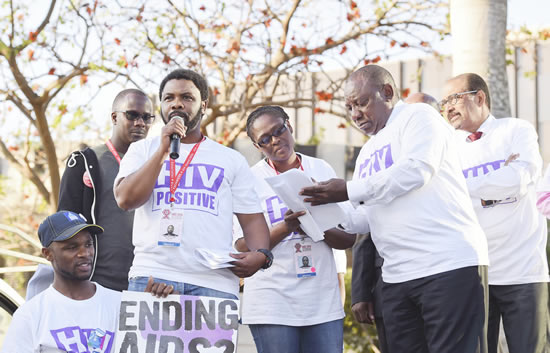 Speaking during the conference, Deputy President Cyril Ramaphosa said since South Africa last hosted the conference, the world had turned the tide on HIV and AIDS.
Speaking during the conference, Deputy President Cyril Ramaphosa said since South Africa last hosted the conference, the world had turned the tide on HIV and AIDS.
“Great progress has been made across the globe, particularly in regions most affected by the epidemic like eastern and southern Africa.
“Of the 17 million people currently on treatment worldwide, nearly 10.3 million are in this region. The latest information from UNAIDS is that the number of people on treatment in eastern and southern Africa has more than doubled since 2010,” the Deputy President said.
AIDS-related deaths in the region have decreased by more than a third over the same period and mother-to-child transmission of HIV has been dramatically reduced.
Deputy President Ramaphosa, who also heads the government’s HIV and AIDS response programmes, told delegates that the South African government is prepared to increase its funding for research and development in HIV.
A big policy shift for SA
A big policy shift for SA lebangWhen President Jacob Zuma delivered his speech on World Aids Day in 2009, he announced far-reaching changes to be implemented in 2010.
In 2010, the Department of Health revised the Prevention of Mother-to-Child Transmission (PMTCT) policy, to include life-long HAART for HIV-positive women with a CD4+ T-cell count of 350, and dual ART from 14 weeks onwards in the pregnancies of HIV-positive women with a CD4+ T-cell count of 350. This is line with the World Health Organisation’s guidelines. HAART is a customised combination of different classes of medications.
For 33-year-old Anna Moganya from Limpopo, who was diagnosed with HIV in 2006, the PMTC programme meant that her positive status did not mean an automatic infection to her unborn child, like had been the case for many women years earlier.
When she was told of her HIV status during the 28th week of her pregnancy, the first thing Moganya thought of was her unborn child.
“I was so scared and angry. I concluded that my baby would be HIV positive. Back then I didn’t know of anyone who had HIV and it was very secretive. But I am happy to say that the treatment prevented my child from getting HIV. He is now a healthy nine-year-old and is HIV negative,” a teary Moganya said, as she shared her story at the International AIDS Conference in Durban.
Moganya certainly represents the hopes of millions of women in South Africa who find themselves in the position of being HIV positive when expecting a baby.
HIV prevalence among newborn babies fell from 8.5 percent in 2008 to below 2.4 percent in 2015. As a result, more than 100 000 babies were protected from HIV infection.
Fast facts
More than 800 000 women have been connected to the prevention of mother-to-child infections through MomConnect, a mobile platform which creates awareness among pregnant women about available health services for their infants.
Fast facts
Fast facts lebang
SA committed to providing HIV treatment
SA committed to providing HIV treatment lebangDeputy President Cyril Ramaphosa has reiterated government’s commitment to providing life-saving HIV treatment to all those who need it.
Currently, South Africa provides 3.4 million HIV positive people with antiretroviral treatment.
Speaking during that the International Aids Conference Deputy President Ramaphosa said the struggle against HIV and Aids has been – and still is – a struggle for a better society.
“We desire a society in which men do not claim dominion over women; a society in which the powerful do not prey on the vulnerable,” he said.
The Deputy President added that as the thousands of delegates gathered in Durban, they were bound to recall the moving plea of an 11-year-old, Nkosi Johnson, for treatment for children like him, who were living with HIV.
Although the world has surpassed its own global treatment targets, by initiating 17 million people on antiretroviral treatment. Many of the 2.5 million children currently living with HIV in South Africa have no access to treatment, due in large to a lack of tailored screening and treatment options.
Deputy President Ramaphosa added that, despite challenges, South Africa had dramatically reduced the transmission of HIV from mother to child.
In 2004, there were 70 000 babies born HIV positive in this country. Today the figure has been reduced to less than 6 000.
News in brief
News in brief lebangNYDA opens new youth office
The National Youth development Agency (NYDA) recently opened its first office in Thohoyandou, Limpopo. The aim of having NYDA offices in rural areas is to ensure that young people have access to youth programmes in the area they live.
Speaking during the official opening, NYDA CEO Khathu Ramukumba said the youth should be assisted as they were the future of the country.
The NYDA has taken a stand that no youth should be left out when it comes to its services. R2,7 billion has been put aside for the upliftment young people and job creation.
Bill Gates to invest $5 billion in Africa
Microsoft founder and philanthropist, Bill Gates will invest $5 billion in Africa during the 14th annual Nelson Mandela Foundation lecture in Pretoria recently.
In the last 15 years Gates invested $9 billion towards towards discovering and developing new and better vaccines and drugs to help prevent and treat diseases in Africa.
Tshwane to host World Choir Games
The World Choir Games, the “Olympic Games” of the global choral community, will be hosted in the City of Tshwane in 2018.
The official announcement was made in June by Interkultur the organising body of the games. The World Choir Games, held every two years, is the largest choir competition on the international calendar.
It is expected that up to 20 000 visitors will attend the games and this is expected to boost the local economy and create job opportunities.
Celebrating the women of SA
Celebrating the women of SA lebang
South Africa’s dramatic – and mostly traumatic – history causes us to go big on anniversaries where we look at the road we have travelled as a nation, and plot our way further forward.
This is certainly true again in August 2016 as we mark 60 years since around 20 000 women marched to the Union Buildings on 9 August 1956 in protest against the extension of Pass Laws to women.
This historic march was a turning point in the role of women in the struggle for freedom and society at large. Since that eventful day, women from all walks of life became equal partners in the struggle for a non-racial and non-sexist South Africa.
The march was coordinated by the Federation of South African Women (Fedsaw) led by four women: Lillian Ngoyi, Helen Joseph, Rahima Moosa and Sophia Williams De Bruyn.
These leaders delivered petitions to the then Prime Minister JG Strijdom’s office at the Union Buildings. Women throughout the country had put their names to these petitions, indicating their anger and frustration at having their freedom of movement restricted by the hated official passes.
With the advent of democracy, the ANC-led government declared August Women’s Month and 9 August as Women’s Day.
Women’s Month is a tribute not only to the thousands of women who marched on that day in 1956, but also a tribute to the pioneers of the women’s movement in this country, dating back to 1913, when women like Charlotte Maxeke led the way in establishing the ANC Women’s League.
This August, government will join communities in marking 60 years since the Women’s Month.
This will be a month for all of us to recognise the challenges that continue to face women in terms of poverty, unemployment and inequality, but also to celebrate our country’s impressive record in reversing or least reducing the disadvantage, discrimination and underdevelopment women suffered as a matter of course under apartheid.
We have electrified households in urban, peri-urban and rural areas. The percentage of households that are connected to electricity supply increased from 69.7 percent in 2001 to 86 percent in 2014.
Millions of people no longer rely on candles for lighting their residential dwellings. The ANC government has reduced the chance of fires in informal settlements in towns and cities, which often destroy people’s belongings. Many rural women are relieved of the burden of fetching firewood from faraway forests.
Great progress has been made in increasing the number of households with access to water infrastructure. Between 2001 and 2014, the percentage of households with access to piped water increased from 61.3 percent in 2001 to 90 percent in 2014. The proportion of households benefiting from free basic water services increased dramatically between 2007 and 2013.
“Women’s Month is a tribute not only to the thousands of women who marched on that day in 1956, but also a tribute to the pioneers of the women's movement in this country...”
Our people, including rural communities, have access to clean and potable water. This means that we have reduced the chances of exposure to diseases such as diarrhea and related illnesses. Women in many informal settlements in cities and towns do not have to ask their neighbours for water.
Far fewer rural women have to travel far distances to reach wells, dams and rivers to fetch water for their households.
The life expectancy of South Africans is increasing. Average life expectancy increased from 53.4 years in 2004 to 62.5 years in 2015.
The increase in average life expectancy is matched by a fast decreasing infant and children-under-five mortality rate. For instance, in 2002, the infant mortality rate was 51.2 babies per 1,000 live births. In 2015, infant mortality rate decreased to 34.4 deaths per 1,000 live births.
We owe these achievements to the mothers, sisters, daughters and granddaughters of our nation who play an active and often leading role in their own development. “Nothing about us, without us,” they declare as they demand that their voices be heard and their ideas be taken seriously and implemented.
Pretoria will be the centre of the national celebration of Women’s Day on 9 August, and men and women all over the country are invited to be part of Women’s Day celebrations in their home provinces and towns because this is a special national occasion.
What will make it even more special is that it will follow six days after the local government elections.
On August 3, millions of women will be on the march again, but not in anger at a stubborn, illegitimate, sexist government; the women of South Africa will be on a short march to voting stations where they will make their voices heard.
By August 4, we should have even more women elected to public office at the level where it matters most: local government.
We wish all female candidates in the election well and we look forward to working with new women leaders to move South Africa forward.
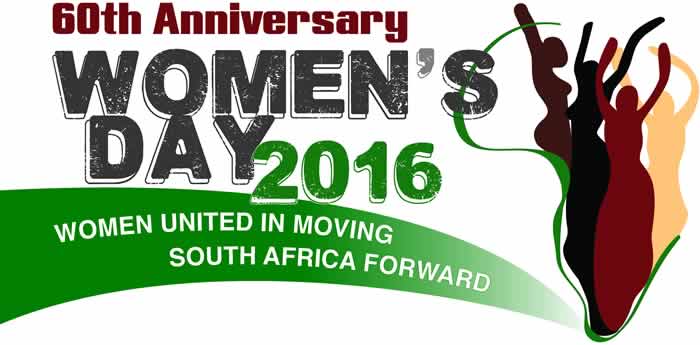
Jericho residents get water
Jericho residents get water lebangThe Department of Water and Sanitation has unveiled a water project that will improve access to water in Jericho, North West.
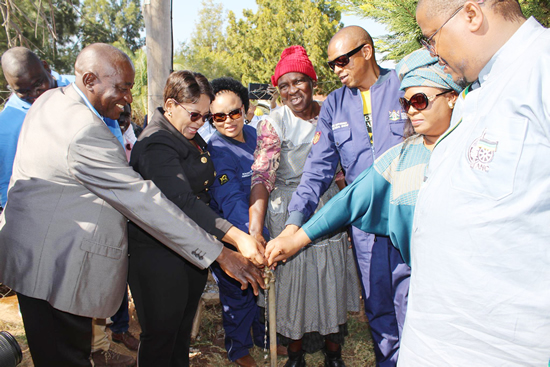 The R15 million Jericho Rural Water Supply Project has contributed to socio-economic upliftment and has increased the security of water supply to the communities of Jericho in Madibeng Local Municipality.
The R15 million Jericho Rural Water Supply Project has contributed to socio-economic upliftment and has increased the security of water supply to the communities of Jericho in Madibeng Local Municipality.
“We can’t compromise services to our people. Water is life and sanitation is dignity.”
The project involves the laying of pipelines, reticulation, testing and drilling of boreholes, establishing the yield of boreholes, as well as connecting the feeder lines to the existing network and the main reservoir.
Speaking during the unveiling ceremony, Minister Nomvula Mokonyane and North West Premier Supra Mahumapelo handed over Water-on-Wheels equipment to indigent people. Each wheel can store 100 kilolitres of water.
The Minister urged community members to play their part in protecting government infrastructure that is meant to improve people’s lives.
“We can’t compromise services to our people. Water is life and sanitation is dignity. We must deal with people who steal water valves and water pumps because what they are doing is sabotage,” said Minister Mokonyane.
R7 million investment benefits Bergville
R7 million investment benefits Bergville lebangKwaZulu-Natal municipalities are benefiting from government’s Small Town Rehabilitation Programme.
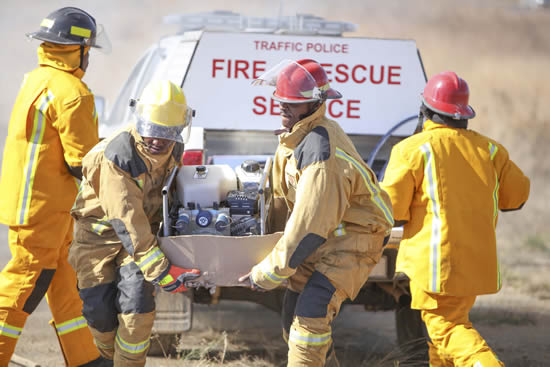 Government’s investment in ensuring that rural communities have access to services has resulted in a disaster management centre and a licence testing centre for the town of Bergville.
Government’s investment in ensuring that rural communities have access to services has resulted in a disaster management centre and a licence testing centre for the town of Bergville.
The Small Town Rehabilitation Programme has benefited several municipalities including that of Ukhahlamba in KwaZulu-Natal. Bergville is part of this municipality.
The Department of Co-operative Governance and Traditional Affairs (CoGTA) has spent more than R7 million on the rehabilitation of Bergville.
The MEC for CoGTA Nomusa Dube-Ncube, together with newly appointed MEC for Transport and Community Safety Mxolisi Kaunda, recently launched these developments.
MEC Dube-Ncube said the main objective of the Small Town Rehabilitation Programme was to grow the economy in rural areas and create a safe and clean environment that will result in investment retention, attraction and expansion.
“In the process, short-term jobs are created through the infrastructure upgrades while more sustainable jobs are created through the private sector investment likely to be attracted”. More than 40 youth from Ukhahlamba Municipality were trained to be fire fighters. “All of them got permanent employment during the opening of this disaster management centre. Security personnel, cleaners were also hired. This Municipality used to rely on fire-fighters coming from the Ladysmith/uMnambithi municipality. This often meant that tourists’ and residents’ safety was not always at the highest of levels, said Dube-Ncube.
MEC Kaunda also views the launch as a significant milestone.
“The community will now save on having to travel to Ladysmith, to get access to these services, said MEC Kaunda.
Inkosi Menzi Hlongwane of the AmaNgwane Tribal Authority said they are happy about the development.
“This really shows that our government is committed to developing rural areas. We never thought that here in Bergville we would ever have a fire station not to mention a testing centre,” he said.
One of the fire-fighters Nompumelelo Mhlungu said when she heard of the learnership she was very reluctant to apply, thinking that they would not consider her application.
“It is an incorrect statement that in order to get a job from government you need to have a connection. I didn’t have a connection. I heard about the opportunity and I applied and then I was taken. Government really gives equally opportunity to every South African,” she said.
Ukhahlamba Local Municipality Mayor Thulani Sibeko said this development is going to save a lot of money for those who want to get a driver’s licence.
“People around here used to go to Estcourt or Ladysmith but now they will use this facility which is nearest to their homes”.
Tshwane empowers the youth
Tshwane empowers the youth andileLocal government
The City of Tshwane’s Tshepo 10 000 programme aims to empower young people. It comprises skills development through entrepreneurship and financial literacy training and the formation of cooperatives.
The programme also provides procurement opportunities through the city’s supply chain management initiatives and mentorship to increase cooperatives’ survival rates and ensure sustainable job creation.
When the programme was launched in July 2013 the city received 52 000 applications from all seven regions in Tshwane, but only 10 000 people were selected.
According to the City of Tshwane mayoral spokesperson, Blessing Manale, the cooperatives that have been provided with technical work have created more than 2 662 contract jobs.
“The city has also provided 279 cooperatives with opportunities at a value of R247 809 696.71,” Manale said.
These opportunities include the supply of goods and the provision of technical work which includes cemetery maintenance, road markings, cleaning services in council buildings, grass cutting services, installing meters, painting and building renovations.
Tshwane skills programme targets the youth
Tshwane skills programme targets the youth andileLocal government
When Nteseng Mogorosi finished matric in 2004 he knew he wanted to be in business for himself, because he believed it would give him the freedom.
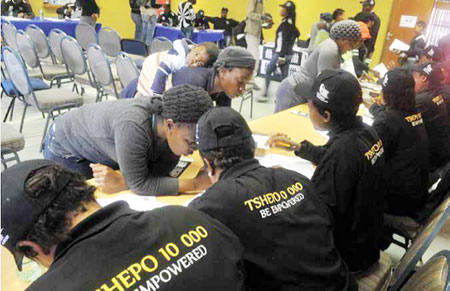 He enrolled at the University of the Witwatersrand to gain a Bachelor of Accounting Science degree, but, unfortunately, he could not complete his studies due to financial challenges.
He enrolled at the University of the Witwatersrand to gain a Bachelor of Accounting Science degree, but, unfortunately, he could not complete his studies due to financial challenges.
However, power utility Eskom gave him a second chance to study for a National Diploma in Financial Management at the Central Johannesburg College, through a learnership programme offered by the entity.
When he completed his studies in 2009, he was offered a permanent job as an accounts payroll officer at Eskom.
However, Mogorosi still dreamed of starting his own business and resigned from his job in 2011 to start his transport business.
He bought a truck, which he used to deliver goods to Zimbabwe from South Africa, but the business failed when his truck was involved in an accident.
“It was a terrible time when the business failed. It was one of the hardest times of my life. But, I could not give up because I had a child to support.
“During that time I read a lot of books about successful people and most of them have failed once or twice. I was 25 years old at the time so I thought that I had plenty of time to recover because I was young,” said Mogorosi.
In 2013, he found out about the City of Tshwane’s Tshepo 10 000 youth skills and entrepreneurship programme and grabbed the opportunity to be part of it with both hands.
After Mogorosi completed the training he and his business partners, which he met through the programme, applied for the registration of a cooperative known as the Mokopu Group.
In March 2014 the business, which offers services in industrial cleaning, grass cutting and pest control and supplies cleaning products, was registered.
It currently employs 17 people full-time and 60 on a temporary basis.
“The biggest challenge that the cooperative faced in the beginning was funding. It was a problem because when we got a purchase order, the City of Tshwane expected us to deliver with our own money and we would only get paid after 30 days,” said Mogorosi.
He added that the partners in the business would borrow money from family members so that they could deliver on purchase orders.
“When we started, each member had to contribute R100 a month towards the business which we used for transport and business-related activities, such as acquiring a BEE certificate, and registering the business.”
Despite the challenges that come with running a business, Mogorosi encourages young people to start their own businesses.
“If you look at the successful economies in the world, most of the economic activities in these countries come from small businesses.
“Tshepo 10 000 is a brilliant initiative because many people who join the programme are unemployed and looking for a job,” he said.
Legal electricity for Joburg’s informal settlements
Legal electricity for Joburg’s informal settlements andileLocal government
City Power, an entity of the City of Johannesburg, is investing millions to reduce illegal electricity connections and ensure the safe use of electricity in informal settlements in and around the city.
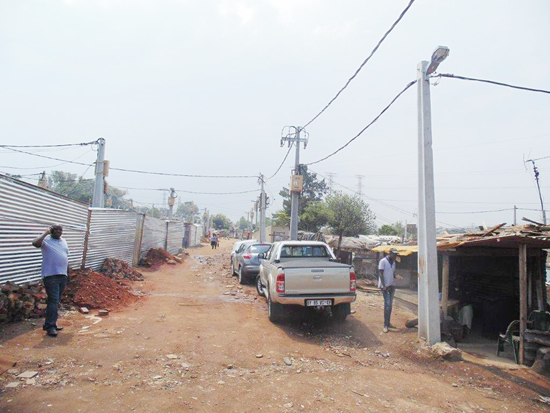 Acting Managing Director of City Power Sicelo Xulu said the electrification process, which includes the installation of prepaid meters, will target all 189 informal settlements within the City of Johannesburg.
Acting Managing Director of City Power Sicelo Xulu said the electrification process, which includes the installation of prepaid meters, will target all 189 informal settlements within the City of Johannesburg.
The informal settlements have been divided into three categories. The first group will be developed by the city soon. This will be followed by those that will take up to 10 years to develop and the settlements in the last category will be relocated.
“These were the guiding principles that the city took and we’ve budgeted R1.3 billion for the next three years for the electrification process.”
Xulu said one of the major reasons why they are putting electricity in informal settlements is to reduce the pressure on the grid due to illegal connections.
“Some of the people in these informal settlements have been tapping into the adjacent townships and this led to pressure on infrastructure.
“All of the illegal connections will be removed and we will start to connect dwellers with legal electricity. They will be metered and will start paying for it.”
So far, City Power has electrified Setswetla Informal settlement (Alexandra), Lolly Station (Lenasia), Princess Plot (Roodeport) and Naren Farm (south of Johannesburg).
Recently, President Jacob Zuma switched on electricity at 7 000 homes in the Thembelihle Informal Settlement, in Lenasia, south of Johannesburg.
The Thembelihle project is worth over R90 million and aims to ensure that this community enjoys the safe use of electricity supplied by the City of Johannesburg.
During the switch on, the President urged other municipalities to learn from the Thembelihle project and use it as a standard in their communities.
The City of Johannesburg and City Power have also rolled out safe and reliable energy supply to light up 200 units at the Diepkloof Hostel in Soweto.
Farm harvests success for businesswoman
Farm harvests success for businesswoman andileWomen's Month
Hard work and dedication were the only ingredients needed for Busi Lubanyana (51) to become a successful businesswoman.
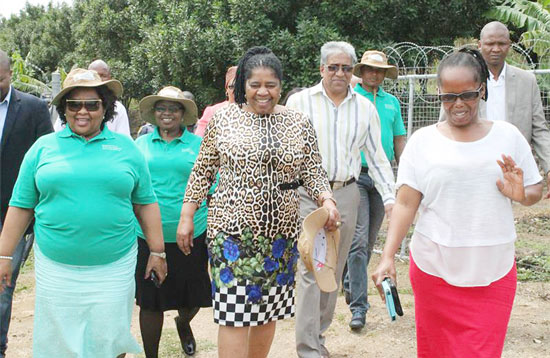 Lubanyana is the owner of BBS farm, situated inland of Southport, in KwaZulu-Natal (KZN), which produces tomatoes, green peppers, bananas and macadamia nuts.
Lubanyana is the owner of BBS farm, situated inland of Southport, in KwaZulu-Natal (KZN), which produces tomatoes, green peppers, bananas and macadamia nuts.
When Lubanyana started her farm, she wanted to help her community to get vegetables easily, but her business grew and the place where she was cultivating became too small.
“I planted vegetables because I like vegetables and I wanted people to eat healthy food,” she said.
Lubanyana approached the KZN Department of Agriculture and Rural Development for help, to get more land for farming. In 2009, the department gave her more land and she has not looked back since.
The farm has grown from a subsistence to a commercial enterprise, with international clients. It exports macadamia nuts to the United States, Europe and the Far East and also supplies Boxer and Spar retail stores with tomatoes and green peppers.
In 2010, Lubanyana entered the Female Entrepreneur Awards in the commercial category and came second. She invested her prize money in her farm, this time to grow macadamia nuts. The Agribusiness Development Agency (ADA) assisted with infrastructure.
“All my efforts didn’t go to waste because today I am the first black female farmer from KZN and the Ugu District to supply macadamias to the export market,” she said.
Lubanyana employs 25 permanent and 10 seasonal staff members. Most of them are women.
Lubanyana told Vuk’uzenzele that getting into the export market was not easy. “It takes hard work, passion, sacrifice and dedication. It took me six years to graduate from a subsistence producer to a qualified export farmer who meets all the requirements and standards,” she said.
Lubanyana explained that being a vegetable farmer has its challenges. “Vegetables are not popular with many farmers because the weather needs to be perfect. It must not be too cold or hot. However, entering competitions has helped me because if I don’t get a good harvest, I am sustained by my winnings,” she said.
The successful farmer received training and support from the department and the ADA. She was trained through the Perishable Product Export Board Council in financial management, agribusiness and marketing, which enabled her to move into the commercial sector.
NYDA boosts small business
NYDA boosts small business andileWomen's Month
After struggling for months to find employment, three young women from Witbank in Mpumalanga decided to take their future into their own hands.
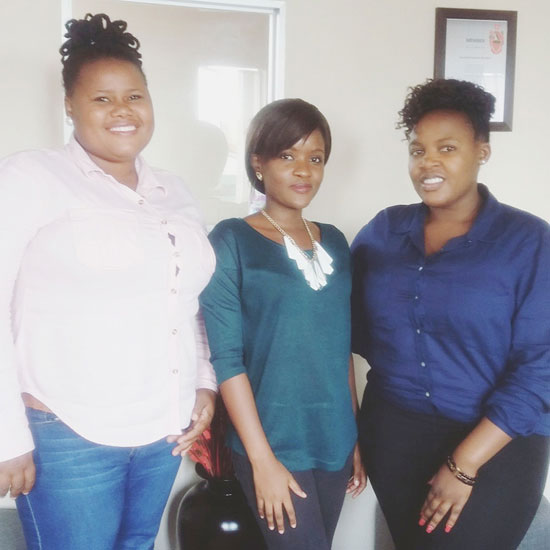 “It was very frustrating and hard to apply for jobs and be rejected knowing that you have the necessary qualifications and experience,” say Khanyisile Mashiane, Philiswa Lawu and Veronica Molaudi.
“It was very frustrating and hard to apply for jobs and be rejected knowing that you have the necessary qualifications and experience,” say Khanyisile Mashiane, Philiswa Lawu and Veronica Molaudi.
They established Armanda Business Accountants, a 100 percent female black-owned accounting firm in July last year.
“We are qualified professional accountants accredited with the South African Institute of Professional Accountants.”
Although it was not easy in the beginning, the three were determined to succeed.
After registering the business, they approached the National Youth Development Agency (NYDA) for funding.
“We intend to empower more young black women, offer them training and give them exposure into the corporate world.”
After discussions with a micro loans officer at the NYDA, they were confident about opening their business.
“After that discussion with him, our path was getting clearer. We then applied for funding from the NYDA and we were subsequently approved for a grant worth R49 000.
“We used that money to buy office furniture and equipment.
“We knew that we had to make it work. It took us nine months of working from home and trying to apply for jobs.
“We then decided to get an office and operate from a formal environment and use our acquired skills from our training to start our own business.”
The firm offers accounting services, independent reviews, tax services, payroll services, business consulting, financial advice and mentoring. They work with small to medium-sized business enterprises, non-profit-organisations and schools.
With the business improving steadily the team wants theirs to be a leading accounting firm that empowers young women.
“We intend to empower more young black women, offer them training and give them exposure into the corporate world. We want to grow our business to the extent that it is recognised nationally and we have branches in every province.”
Their message to young people in a similar situation is: “Do not let your disadvantaged background cave you in. The world is big, get out there and achieve your dreams. Work hard, persevere and focus.”
For more information on the NYDA call: 0800 52 52 52 or visit: www.nyda.gov.za
Building a legacy
Building a legacy andileWomen's Month
Fortunate Mdanda is a businesswoman who is determined to succeed. As the owner of Smith Capital Equipment, she is one of a few women who are making it in a male-dominated industry.
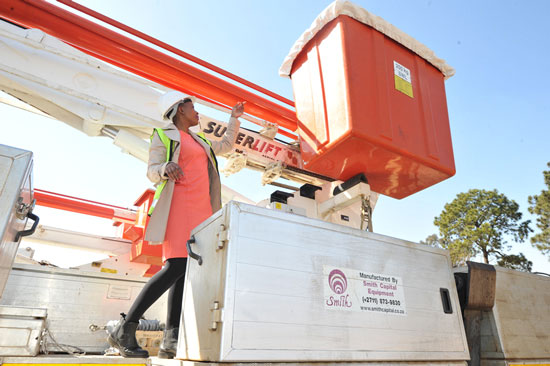 In November 2015 she and her husband bought Smith Capital Equipment, a business with over 30 years’ experience in the equipment industry.
In November 2015 she and her husband bought Smith Capital Equipment, a business with over 30 years’ experience in the equipment industry.
Smith Capital Equipment is the only company in Africa that designs and manufactures aerial platforms. It manufactures platforms, supplies truck-mounted cranes and drilling rigs and exports its equipment to countries across the African continent.
The acquisition of the company resulted in the birth of Smith Capital, an African company. It’s owned, managed and operated by Africans.
“We are a BEE level 2, majority black- and women-owned and operated business, with effect from November 2015,” said Mdanda.
The company has created 76 permanent jobs, 12 of which are held by women. This is a figure would like to see increase.
“We would like the figure to improve and we’ve got plans to take in mostly young women, who will get in-service training and internships.”
Mdanda was granted a loan of R41 million by the National Empowerment Fund (NEF), which she must pay back in five years.
“We have been working tirelessly to change the culture of Smith Capital employees. The culture we are infusing is that of accountability, responsibility, ownership and corporate entrepreneurship.”
The products are locally designed and manufactured and the company’s biggest clients are Eskom, mines, municipalities and countries, mostly from the African continent and South America. The company also maintains and repairs Eskom units.
“We specialise in two types of aerial platforms, one is an insulated aerial platform.
“Those are the platforms that are used when people are working on a live line, so that they do not switch the power off.”
The platforms differ in height and are between 60 and 110 metres in size, the highest of which is imported from Finland.
Mdanda is a qualified accountant with a BCom Accounting Degree from the University of South Africa, an Honours Degree in BCom Accounting and an MBA from Unisa.
She has worked at various companies and government organisations, including the Auditor-General of South Africa, South African Airways, Pfizer, City Power and Alexander Forbes.
Mdanda encourages women not be scared to venture into male-dominated spaces, but to rather roll up their sleeves and change their circumstances.
Rising above the odds
Rising above the odds andileWomen's Month
If Nhlupheheng Tsotetsi had the funds to study at the university when she wanted to, her life would probably have turned out very differently and she would have missed out on an exciting career in aviation.
 “I didn’t see it that way then, but it turned out that not having money to further my studies at university was the best thing that happened to me, because today I am part of the dynamic world of aviation and enjoying every minute of it,” said the 39-year-old, who is an airworthiness safety inspector at the South African Civil Aviation Authority (SACAA).
“I didn’t see it that way then, but it turned out that not having money to further my studies at university was the best thing that happened to me, because today I am part of the dynamic world of aviation and enjoying every minute of it,” said the 39-year-old, who is an airworthiness safety inspector at the South African Civil Aviation Authority (SACAA).
Tsotetsi grew up in Daveyton, a township in Gauteng’s Ekurhuleni Metropolitan Municipality and after matric, she wanted to study for a BSc in Microbiology and Biotechnology at the University of Witwatersrand. However, due to financial difficulties, she could not do so.
She eventually enrolled at Ekurhuleni East College where she graduated with a National Diploma in Electrical Engineering. After graduating she could not get a job. A friend told her about an apprenticeship programme offered by state-owned Denel Aviation. She applied and her application was successful, and the rest is history.
After two years of study towards an Aircraft Trade Certificate, Tsotetsi graduated in 2002 as a qualified aircraft avionician. According to Denel Technical Academy, Aircraft Avionician training incorporates all three existing aircraft avionic-related trades namely: aircraft electrician, aircraft radiotrician and aircraft instrument mechanic.
In 2004 she joined the SACAA Aircraft Certification department as an airworthiness safety inspector focused on manufacturing of aeronautical products. Tsotetsi and her team are responsible for the administration and enforcement of civil aviation safety regulations and standards related to the modification of aircraft as well as the manufacturing of aviation components and parts.
“This simply means that if you intend manufacturing new aircraft and/or aircraft components and parts, you have to first comply with certain requirements as outlined in civil aviation regulations,” she explained.
Tsotetsi urges women and young South Africans to consider a career in aviation; adding that there are bout 40 different career fields in aviation.
“As much as there are women in the aviation industry, their number compared to those of males is low. Those that are keen on pursuing careers in aviation should ideally study pure Mathematics and Science in school.
This should be followed by aviation-specific training and qualification. To join the SACAA as an aviation inspector one is also required to have specialised training coupled with the relevant experience.” Tsotetsi’s message to young women interested in aviation is simple.
“You must have self-confidence and be prepared to work hard. Keep knocking on as many doors as possible for opportunities after all, in aviation the sky is not the limit, it is in most cases someone’s office.”
Tsotetsi is currently studying towards a B-Tech Degree in Electronic Engineering. She also intends to train as a helicopter pilot in the near future.
*Kabelo Ledwaba works for the South African Civil Aviation Authority.
From farm worker to farm owner
From farm worker to farm owner andileWomen's Month
When Sithembile Buthelezi (36) dropped out of school because she was sick, she also gave up on her dream of becoming a professional nurse. For over five years Buthelezi worked on a piggery as a labourer.
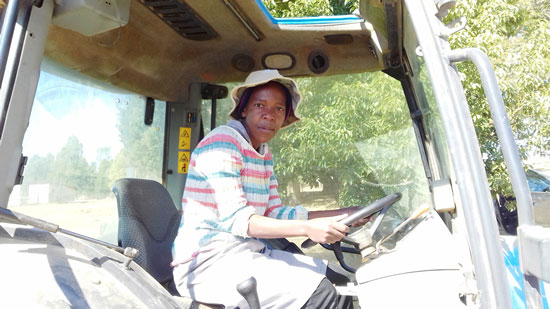 “It was very tough at the time. I am even shy to tell my friends that I was a farm worker. I came home very dirty because of the place I worked in. One day it became too much and I told my mother that I wanted to quit. My mother insisted that I go back to work. Today I thank my mother for pushing me to work because had it not been for her, I wouldn’t be where I am today.”
“It was very tough at the time. I am even shy to tell my friends that I was a farm worker. I came home very dirty because of the place I worked in. One day it became too much and I told my mother that I wanted to quit. My mother insisted that I go back to work. Today I thank my mother for pushing me to work because had it not been for her, I wouldn’t be where I am today.”
Today Buthelezi is co-owner of Inkululeko Piggery Farm, which is part of the Inkululeko Trust Farm. Situated in Mooi River, in the Mpofana Local Municipality, the 200-hectare farm is owned and managed by Buthelezi and 29 business associates. It employs 20 people.
Inkululeko Trust Farm acquired land through the Land Redistribution for Agricultural Development Programme (LRAD) in 2008. When the farm started it had 200 pigs, but now has more than 2 000. The farm breeds and sells pigs to the market for meat production and on average sells 100 pigs every fortnight.
“I didn’t like pigs. I never thought that one day I would own this pig farm. I never thought that I would be a boss, especially given my circumstances. I am a living example that with hard work anything is possible,” she said.
In 2012 Buthelezi won the Best Farm Worker Award and used the prize money to build and furnish a house and buy five cows. The project was also Top Entrepreneur: Small Holder at provincial level in 2014. Buthelezi’s advice to aspiring farmers is to be patient.
“The farming business is not as simple as it looks and you must have patience because you cannot start now and make money tomorrow. It’s a long process that requires patience and a love of farming,” she said.
Buthelezi said the secrets to her success are determination, commitment and exchanging experience with other farmers and a love of farming. She said next year she will take a bold step and start her cattle farming business.
A female farmer driven by passion
A female farmer driven by passion andileWomen's Month
Selebaleng Anna Ratshikana, a former nurse turned farmer, is proof that it is never too late to follow your passion.
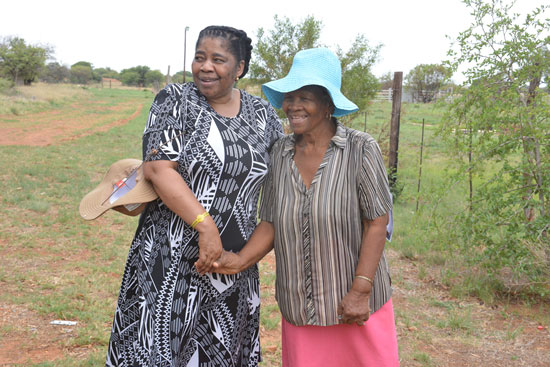 Ratshikana, who runs a farm in Blaauwbank between Mafikeng and Lichtenburg in the North West, is a beneficiary of government’s intervention under the Land Redistribution for Agricultural Development (LRAD) programme.
Ratshikana, who runs a farm in Blaauwbank between Mafikeng and Lichtenburg in the North West, is a beneficiary of government’s intervention under the Land Redistribution for Agricultural Development (LRAD) programme.
The Department of Rural Development and Land Reform initiative aims to assist previously disadvantaged citizens to access land specifically for agricultural purposes, or to make better use of land already accessed.
Soon after her retirement in 1995, Ratshikana decided to follow her passion for farming. She bought a farm with the help of the then Department of Land Affairs, now Rural Development and Land Reform.
“I learned farming from my grandmother as a little girl growing up in Dinokana in Lehurutshe, outside Zeerust. Every Friday after school, we would go to the farm with my friends to help and that’s where my love of farming started.”
Her 299.79 hectare farm, which was bought in 2002, is situated 30 km outside Mafikeng on the Lichtenburg Road. It focuses on crop and livestock production.
“I plough maize, beans, sunflowers and wheat and supply fruit and vegetable stores, mini markets and hawkers.”
As proof that farming is her passion, she won the provincial Female Farmer of the Year award in August 2002, the same year she started farming.
“I was very happy that I was chosen as the best farmer that year.”
With the winnings she bought farming implements and dug two boreholes, because the farm did not have a reliable supply of water.
In 2004/5 Ratshikana won an award, again at provincial level, of R70 000 and she received a trophy.
She said the assistance she has received from government has helped her a great deal to ensure that her farm succeeds.
“The government is doing well to support us, especially black female farmers. In 2005 it gave me a R700 000 grant for my farm.
“I bought two tractors, additional implements and a grader with the money, and so far things are going well on my farm.”
Ratshikana’s message to young people, especially young women who want to get into farming, is to work hard.
“If you are getting into farming, you must get into it for the love and passion, not to chase money. You must also understand that there is no substitute for hard work. It is central to the success of your farm,” she added.
Tracking a serial rapist
Tracking a serial rapist Estelle GreeffWomen's Month
After 10 years on the job at the South African Police Service (SAPS) Beauty Queen Nchabeleng believes serving and protecting the people of South Africa is her calling.
![]() Constable Nchabeleng and three friends applied for the posts advertised in 2004, and two years later she joined the Lebowakgomo Family Violence and Child Protection and Sexual Offences Unit.
Constable Nchabeleng and three friends applied for the posts advertised in 2004, and two years later she joined the Lebowakgomo Family Violence and Child Protection and Sexual Offences Unit.
“Of the four of us, I’m the only one who was called for an interview and I’m the only one who works for the SAPS. This is a job that I was given by God.”
She said the experience, challenges and the joy of working for the SAPS is second to none and she wouldn’t trade it for anything.
“I’m able to work in any environment because with this job you are forced to leave your comfort zone.”
“Working for the SAPS has made me street smart. I’m able to work in any environment because with this job you are forced to leave your comfort zone.”
Growing up in the crime-ridden Ga-Masemola region in Limpopo, Nchabeleng says she is happy to be making a difference with her work.
The biggest difference she has made in her career so far was apprehending a serial rapist who had been terrorising the community of Lebowakgomo, south east of Polokwane.
Nchabeleng nabbed the rapist after going undercover and setting a trap for him.
She donned a school uniform and walked the same route the rapist was targeting.
It wasn’t long before a stranger emerged and politely said ke kgophela go botshisha.
“I was shaking and very nervous. I turned and reached for my gun which was in my bag, just to make sure it was still there.”
As the man came closer, Nchabeleng sized him up. “He wasn’t that big. If he tried something I was going to show him what I’m made of.”
Nchabeleng said after she gave him the wrong name and he declared his love for her she made arrangements to meet with him the next day. She then took pictures of him under the pretext that she admired him.
“I told him I want to look at his picture before I sleep at night. I took three photos.”
She then took back the picture to some the victims, who all confirmed that he was the one who had raped them.
Nchabeleng met the man the following day and lured him to a police station under the pretext that she needed to certify some documents and sign an affidavit.
Once at the police station, she alerted her colleagues and the man was arrested on the spot.
William Koketso Muroa was found guilty of multiple counts of rape and is currently serving an 84-year sentence in prison.
“I only now realise the danger I put myself in, but if I had to, I would do it all over again.”
Farmer defies odds
Farmer defies odds Estelle GreeffWomen's Month
Female farmer Philiswa Fadana (54) is living proof that it is possible to rise above difficult circumstances.
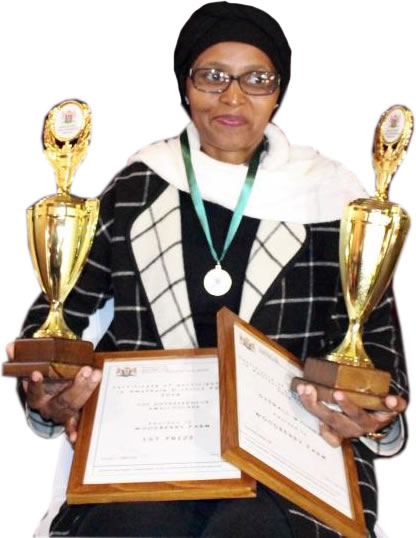 Last month Fadana earned a spot in the Eastern Cape Female Farmer of the Year awards, after taking top accolades in the Amathole District Municipality leg of the competition.
Last month Fadana earned a spot in the Eastern Cape Female Farmer of the Year awards, after taking top accolades in the Amathole District Municipality leg of the competition.
Speaking to Vuk’uzenzele from her butchery in East London shortly after the awards, Fadana said her career as a regional manager of a leading bank was cut short by a disability caused by a car accident in 2009.
The accident left her unable to speak above a whisper or to drive long distances, both of which were essential to executing her duties efficiently at her bank job.
The mother of four turned to farming to make a living – a trade she said has been her passion since childhood, thanks to her grandmother.
Fadana and her husband own and run the Woodberry Farm in Haga-Haga, near East London, which they got with help from the Eastern Cape Department of Rural Development and Agrarian Reform.
Woodberry Farm has been running since 2012, breeding cattle, sheep, pigs, goats and poultry and producing fruit, maize and macadamia nuts.
Fadana said farming has proved to have its own challenges, especially when trying to get into the commercial space.
“So I decided to open up this butchery in May this year so that we can slaughter and sell our own meat to the public. The prize money will go towards expanding the butchery,” she said.
She is due to compete with farmers from various districts in the provincial awards, to be held at the end of this month.
“I was very excited to win. I am starting to realise my dream. When I became disabled after an accident I could not work and had to be medically boarded. I got into farming because I grew up in farming and my husband is also passionate about farming,” said Fadana.
Her aim is to grow her business along much of the value chain in livestock farming.
“In future I would like to have my own abattoir. I am optimistic and I will find a way to make this happen.”
Eastern Cape Rural Development and Agrarian Reform MEC Mlibo Qoboshiyane congratulated all the district winners.
“The awards keep giving female farmers an opportunity to grow their businesses in a way that proves beyond a doubt that women are capable of running successful agriculture enterprises,” said Qoboshiyane.
Winners of each district category will automatically qualify for the provincial competition to be held this month, where the best performing farmers will be anounced.
Crime scene examiners get empowered
Crime scene examiners get empowered Estelle GreeffAcornhoek in Mpumalanga might be a small town but it is home to a policewoman with a big future.
 Warrant Officer (WO) Sejeng Marcia Kgoete (25) is a poster girl for the new generation of police officers. And she has the certificate to prove it, after achieving 98 percent – the highest of all 23 participants – in the first-ever Crime Scene Examiner Learning programme. The programme was held over 12 weeks from January to March at the SAPS Tshwane Training Academy in Pretoria-West.
Warrant Officer (WO) Sejeng Marcia Kgoete (25) is a poster girl for the new generation of police officers. And she has the certificate to prove it, after achieving 98 percent – the highest of all 23 participants – in the first-ever Crime Scene Examiner Learning programme. The programme was held over 12 weeks from January to March at the SAPS Tshwane Training Academy in Pretoria-West.
She and 22 other officers spent three months of intense training, mastering basic photography, applied crime scene photography, videography, plan drawing, transfer marks, forensic investigation and court procedures.
The learning programme is aimed at empowering crime scene examiners with crime scene protocols as per National Instruction 1 of 2015: while adhering to the International Organisation for Standardisation (ISO).
It is intended that the programme be followed by intermediate and later advanced level courses that will allow the crime scene examiners to become accredited specialists in their field.
“The learning programme has equipped me with the necessary theoretical and practical skills to properly execute my job. It was challenging in that all theory had to be demonstrated practically by the participants,” said WO Kgoete.
CSI is underpinned by the Locard’s Exchange Principle, which states that whenever someone enters or exits an environment, something physical is added to and removed from the scene.
It is this that allows examiners like WO Kgoete to link suspects to victims, to physical objects and to scenes.
The participants were carefully selected from Local Criminal Record Centres (LCRCs) and Crime Scene Management Offices countrywide, and also included officers from National Head Office. Whilst some had previously undergone the old 10-week advanced crime scene examiners programme, others were virtual novices, like WO Kgoete, who only joined the SAPS in September 2015.
Since then, she has been receiving training as a crime scene examiner and says she is fortunate to ‘love my job’.
That she is a woman in a traditionally male-dominated world does not daunt her. “Women have broken through the barriers of gender inequality in the SAPS. They bring a new dimension in that they are mentally and physically equipped to perform the same functions as men.
“I would not be the woman I am today without the love and support of a strong and prayerful woman ... my mother shaped me to become a responsible, God-fearing young woman with a strong moral backbone.”
New mobile police station for Khayelitsha
New mobile police station for Khayelitsha Estelle GreeffPolice Minister Nkosinathi Nhleko says the South African Police Service (SAPS) will be rolling out 15 mobile police stations to far-flung townships and rural areas around the country.
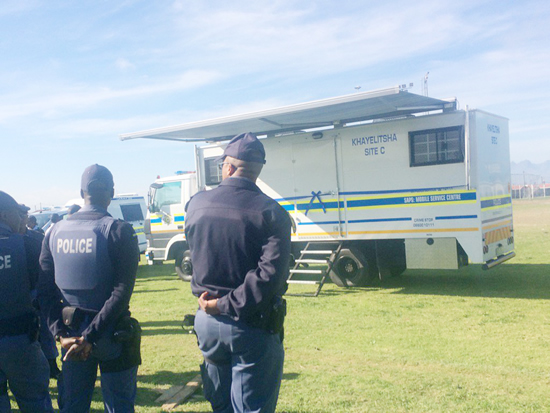 Six of them are expected to be located in the Western Cape.
Six of them are expected to be located in the Western Cape.
The Minister made the announcement when he handed over a mobile police station to Khayelitsha residents at an Imbizo recently.
“We understand the demand for more police in the rural towns and townships, but due to resource constraints to respond to these demands effectively, rolling out mobile units is the best solution at the moment,” said the Minister.
“We need to combine efforts in taking down gangsterism in the Western Cape. Safety cannot only be brought by the police, more departments are involved in ensuring safety in our communities,” he said.
The Minister said issues like street lighting, adequate roads and town planning – which would make it easier for police officers to patrol communities - were functions that belonged to other departments.
Ndithini Tyhido, chairperson of the Khayelitsha Development Forum, agreed that adequate infrastructure such as proper house addresses and lighting would improve the effectiveness of policing in the area.
He said crime in Khayelitsha was rife but that the new mobile police station meant residents would be able to access police services much faster.
Nomatha Velebhayi, a resident in Site C, said she was pleased with the new mobile unit as it would speed up the response rate of police to the community’s calls.
“Crime in Site C is unspeakable but I am relieved now that they have brought the police closer to us.”
She said the residents can also make a difference by reporting perpetrators which live in the community.
Jobs: Justice and Constitutional Development Aug 2016 - 1
Jobs: Justice and Constitutional Development Aug 2016 - 1 Estelle GreeffCourt Manager (2 posts)
Reference: 16/94/FS
Salary: R389 145 - R458 385 per annum. The successful candidate will be required to sign a performance agreement.
Requirements: Three (3) years qualification in Administration in (NQF Level 6) and I or National Diploma in Service Management (NQF Level 5) plus module in Case Flow Management or equivalent qualification ; At least 3 year's managerial or supervisory experience; Knowledge and experience in office and district administration; Knowledge of the Public Financial Management Act (PFMA); Experience in managing Trust (Third Party Funds) and Vote Account; A valid driver 's licence; Experience in the Court environment will be an added advantage.
Enquiries: Ms NN Sithole Tel: 051 407 1800
Assistant State Attorney (LP3-LP4)
Reference: 16/183/SA
Salary: R247 236 - R637 860 per annum. (Salary will be in accordance with OSD determination). The successful candidate will be required to sign a performance agreement.
Requirements: An LLB or 4 year recognized legal qualification; Admission as an Attorney; At least 2 years appropriate post qualification legal/ litigation experience; A valid driver 's licence.
Enquiries: Ms K Ngomani Tel: 012 357 8661
Social Worker/Family Counsellor (Grade 1)
Reference: 153/16/FA/WC
Salary: R211 263 - R 244 908 per annum (Salary will be in accordance with OSD determination). The successful candidate will be required to sign a performance agreement.
Requirements: Bachelor Degree in Social Work or equivalent qualification which allows for professional registration with the SACSSP; An appropriate experience in social work after registration with the SACSSP; Knowledge and experience in Mediation; Court Experience in Evidence; Knowledge and application of Family Law, including Mediation in certain Divorce Matters Act , Children's Act, Maintenance Act and Domestic Violence Act (inclusive of Hague Convention on International Child Abduction); A valid drivers' licence.
Enquiries: Advocate N Britz Tel: (023) 347 1238
Maintenance Officer (MR1 - MR4) - (8 posts)
Reference: 16/141/KZN
Salary: R162 726 - R291 249 per annum (Salary will be in accordance with OSD determination). The successful candidate will be required to sign a performance agreement.
Requirements: LLB Degree or four year recognised legal qualification; Appropriate post qualification legal experience; Extensive knowledge and understanding of the maintenance system and family law matters; Knowledge of the Maintenance Act (Act 99 of 1998). A valid driver 's licence
Enquiries: Mr J.N. Mdaka Tel: (031) 372 3000
Closing date is 8 August 2016
NOTE: Interested applicants may visit the following website: www .justice.gov.za or www.dpsa.gov.za to view the full job specification of the above positions. Applications must be submitted on Form Z83, obtainable from any Public Service Department or on the internet at www.gov.za. A Z83 form & CV must be accompanied by original certified copies of qualifications and identity document and a driver 's licence where necessary. A SAQA evaluation report must accompany foreign qualifications. Applications that do not comply with the above mentioned requirements will not be considered. All shortlisted candidates for SMS posts will be subjected to a technical exercise that intends to test relevant technical elements of the job, the logistics of which will be communicated. Following the interview and technical exercise, the selection panel will recommend candidates to attend a generic managerial competency assessment (in compliance with the DPSA Directive on the implementation of competency based assessments). Candidate will complete a financial disclosure form and also be required to undergo a security clearance. If the candidate is applying for an OSD post, certificates of service must be attached to the CV.
The DOJ&CD is an equal opportunity employer . In the filling of vacant posts the objectives of section 195 (1) (i) of the Constitution of South Africa, 1996 (Act No: 108 of 1996), the Employment Equity imperatives as defined by the Employment Equity Act, 1998 (Act No: 55 of 1998) and relevant Human Resources policies of the Department will be taken into consideration. Reasonable accommodation shall be applied for People with Disabilities including where drivers licence is a requirement. Shortlisted candidates will be subjected to a personnel vetting process. Correspondence will be limited to short listed candidates only. If you do not hear from us within 3 months of this advertisement, please accept that your application has been unsuccessful. The department reserves the right not to fill these positions. Women and people with disabilities are encouraged to apply and preference will be given to the EE Target.
Tel: 012 315 1111 Private Bag X81, Pretoria, 0001 Momentum Centre, 329 Pretorius Street, Pretoria, www.justice.gov.za Twitter Facebook
National Orders call for nominations
National Orders call for nominations Estelle Greeff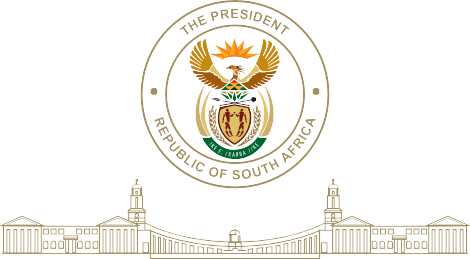 National Orders are the highest form of recognition that South Africa bestows on deserving citizens. The President of the Republic as the Grand Patron of the National Orders, awards these orders, which are inclusive and represent all South Africans.
National Orders are the highest form of recognition that South Africa bestows on deserving citizens. The President of the Republic as the Grand Patron of the National Orders, awards these orders, which are inclusive and represent all South Africans.
The Chancery of Orders is inviting nominations of individuals deemed worthy recipients of the following National Orders:
The Order of Mapungubwe
(Category: I Platinum; II Gold, III Silver, and IV Bronze)
The Order is awarded to South African citizens who have accomplished excellence and exceptional achievements to the benefit of South Africa and beyond.
The Order of Baobab
(Category: I Gold; II Silver and III Bronze)
The Order is awarded to South African citizens who have made exceptional and distinguished contributions in the following categories: community service, business and the economy, science, medicine and technological innovation.
The Order of Luthuli
(Category: I Gold; II Silver and III Bronze)
The Order is awarded to South African citizens in recognition of outstanding contribution in the struggle for democracy; nation-building; building democracy and human rights; justice and peace as well as for the resolution of conflict.
The Order of Ikhamanga
(Category: I Gold; II Silver and III Bronze)
The Order is awarded to South African citizens who have excelled in the field of arts, culture, literature, music, journalism and sport.
The Order of Mendi for Bravery
(Category: I Gold; II Silver and III Bronze)
The Order is awarded to South African citizens who have distinguished themselves by displaying extraordinary acts of bravery through which their lives were placed in great danger or who have lost their lives, including trying to save the life of another person or by saving property, in or outside the Republic of South Africa.
Companions of OR Tambo
(Category: I Gold; II Silver and III Bronze)
The Order of the Companions of OR Tambo is awarded to eminent foreign nationals for friendship shown to South Africa. It is therefore concerned primarily with matters of peace, cooperation, international solidarity and support and is integral to the execution of South Africa’s international and multilateral relations.
|
|||||||||||||||||||||||||||||||||||||||
- an introductory paragraph with summary of the nominee’s achievements
- a list of exceptional milestones reached by the nominee in his/her career and/ or international arena
- a description of the exceptional, outstanding, dedicated service or act of bravery rendered by the nominee.
This form can be downloaded from the following website: www.thepresidency.gov.za
The closing date for nominations: 31 August 2016.
Email: nominations@presidency.gov.za Fax: 086 646 5373
Postal address:The Chancery of Orders, Private Bag X1000, Pretoria, 0001 Delivery address: Chancery of Orders,The Presidency, Room 225, East Wing, Union Buildings, Pretoria, 0001
Eradicating back-log notice
Eradicating back-log notice Estelle Greeff The Compensation Fund is in the process of implementing various activities aimed at improving service delivery. We have a dedicated team of officials assisting with clients enquiries.
The Compensation Fund is in the process of implementing various activities aimed at improving service delivery. We have a dedicated team of officials assisting with clients enquiries.
The Compensation Fund hereby requests all clients/employees who have enquiries regarding medical claims, company registrations and letters of good standing to forward their enquiries to the following attention:
Name: Mr Xola Mnene
Director: Customer Care
Contact numbers:
Landline: 012 319 9242/9495
Tollfree: 0860 105 350
Cellphone: 082 937 2062 (you can also send a sms or please call me)
Email: Customercare@labour.gov.za or Compensation@labour.gov.za
Yours in service delivery.
Vuyo Mafata
Compensation Commissioner.
28 June 2016
Jobs: National Metrology Institute of South Africa
Jobs: National Metrology Institute of South Africa JoyAre you a quality driven individual? | Do you have a passion for perfection? If you answered “Yes” to these questions, you could be just the individual we are looking for
The National Metrology Institute of South Africa through its Human Capital Development (HCD) programme develops a pipeline of skilled scientists, engineers and technologists to address current and future skills needs. The following opportunities are available for students and graduates:
Post Graduate Studentship Opportunities
Bursary value of R120 000.00 per annum (excluding prescribed registration and tuition fees)
PURPOSE OF THE ROLE: To complete a Master’s degree, within a 2 year period, based on the technical needs of the National Metrology Institute of South Africa. The studentships include full-time work on projects at the NMISA’s laboratories in Pretoria with the majority of time allocated for studies and interaction at the academic institutions.
Masters Studentship: Time And Frequency Project X2
Masters Studentship: Watt Balance Project X2
Masters Studentship: Investigation, Modelling & Evaluation Of A Radio Frequency Noise Measurement System Project X1
Closing date for applications: 31 August 2016
Please view the full adverts by visiting www.nmisa.org
Please note: NMISA subscribes to and applies the principles prescribed by the Employment Equity Act. Preference will be given to previously disadvantaged candidates who meet the requirements and who will add to the cultural and gender diversity of the organisation. The NMISA Human Capital Development programme, which these Master’s Studentship forms part of, is focused on recruiting the following candidates in order of preference: African, Coloured & Indian.
Interested and suitably qualified persons MUST upload/ attach all supporting documentation required (CV, certified educational qualifications and official academic records and ID) when applying for the position. Only candidates with all supporting documents and completed questionnaire will be considered for the position. Apply on our NMISA website www.nmisa.org under vacancies.
Correspondence will be limited to short-listed candidates only. By applying for this position at the NMISA, the applicant understands, consents and agrees that the NMISA may solicit a credit and criminal report from a registered credit bureau and/or the SAPS in relation to positions that require trust and honesty and/or entails the handling of cash or finances and may also verify the applicant’s educational qualifications and employment history.
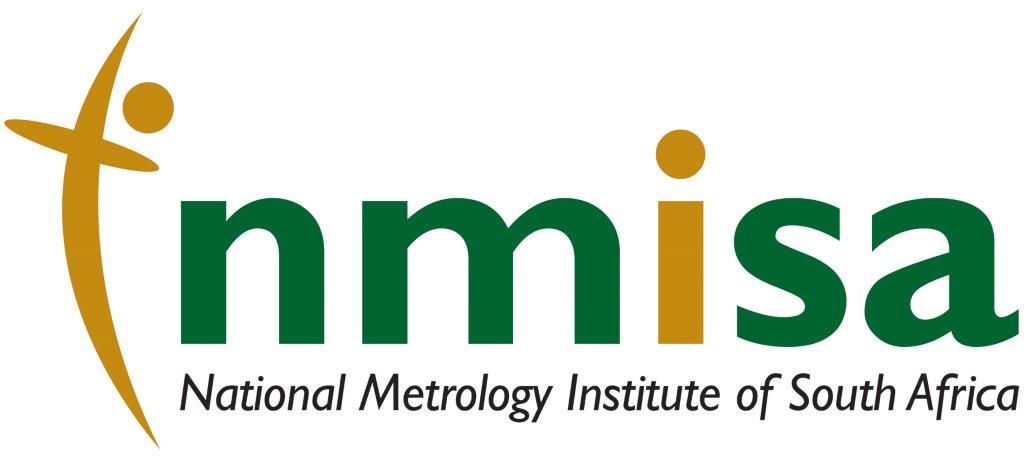
Jobs: Department of Communications
Jobs: Department of Communications JoyDeputy Director-General: Communications Policy Research and Development
Branch: Communications Policy Research and Development
Salary: All-inclusive remuneration package R1 267 806.00 per annum
Reference number: DDG: Policy/07/16
Centre: Pretoria
Deputy Director-General: Entity Oversight
Branch: Entity Oversight
Salary: All-inclusive remuneration package R1 267 806.00 per annum
Reference number: DDG: EO/07/16
Centre: Pretoria
Chief Director: Regulatory Institutions
Branch: Entity Oversight
Salary: All-inclusive remuneration package R1 042 500.00 per annum
Reference number: CD: RI/07/16
Centre: Pretoria
Director: Internal Audit And Risk Management
Office of the Director-General: Department of Communications
Salary: All-inclusive remuneration package R864 177.00 per annum
Reference number: D: IA&RM/05/16
Centre: Pretoria
Director: Information Management And Technology
Chief Directorate: Corporate Services
Salary: All-inclusive remuneration package R864 177.00 per annum
Reference number: D: IM&T/07/16
Centre: Pretoria
Enquiries: Ms Mathope Thusi, Tel 012 473 0174
Closing date: 8 August 2016
To apply
- Applications must be submitted on the Application for Employment form (Z.83) [PDF] 31 kb. Please print and complete the form or obtain it from any Public Service department.
- The completed and signed form Z83 should be accompanied by a recently updated, comprehensive CV as well as certified copies of all qualification(s) and ID-document (certification stamp should not be older than three months).
- Suitable candidates will be subjected to a personnel suitability check (criminal record, citizenship, credit record checks, qualification verification and employment verification).
- Forward your application, quoting the relevant reference number and the name of the publication in which you saw this advertisement, to: The DG, Department of Communications, Private Bag X745, Pretoria, 0001 or hand delivered to Tshedimosetso House, 1035 Francis Baard Street, Hatfield, Pretoria
The DoC is an equal opportunity employer. Applicants with disabilities are welcome to apply. Applications must be submitted on Form Z83, obtainable from any Public Service department and be accompanied by a comprehensive curriculum vitae and certified copies of qualifications and identity document. (Failure to comply with these requirements will result in the application being disqualified). Certification stamp must not be older than three months. Suitable candidates will be subjected to a personal suitability check (criminal record, citizenship, credit record checks, and qualification and employment verification).
Correspondence will be limited to successful candidates only. If you have not been contacted within one month after the closing date of this advertisement, please accept that your
application was unsuccessful.
Jobs: Limpopo Office of the Premier
Jobs: Limpopo Office of the Premier JoyApplications: The Acting Director General, Office of the Premier, Private Bag X 9483, POLOKWANE, 0600 or Hand delivered to the Office of the Premier, No 40 Hans Van Rensburg Street, Mowaneng Building, Office No.A013, General Records (Registry), Ground Floor.
Management Echelon
Director General: Office of The Premier
(5) Years Fixed Term Contract) Ref No. OTP/14/16/01
Salary: R1, 656 618 per annum (SMS Grade D, salary level 16). Non-pensionable HoD allowance: 10% of the payable inclusive remuneration package
Centre: Polokwane
Requirements: An undergraduate qualification NQF level 7 and a post graduate qualification NQF level 8 as recognised by SAQA; At least 8 -10 years’ experience at a Senior managerial level(5 years of which must be with an organ of State as defined inthe Constitution, Act 108 of 1996). Extensive experience in an independent constitutional institution supporting democracy or public entity will be an added advantage. Ability to interact at both strategic and operational levels; Proven managerial skills; Key Competencies and Skills: Demonstrated ability to: Apply strategic thinking processes to influence the conceptualisation of a vision, align internal processes, systems and goals to the vision, give direction and inspire staff to enable the Office of the Premier (OTP) and support to the Provincial Admin as a whole to optimally deliver on its Constitutional and legislative mandates; Continuously identify ways to improve internal processes within and outside the Office so as to enable the Provincial Admin as a whole to deliver effectively, economically and efficiently on its mandates; Apply own judgement and take bold decisions in the context of varied levels of risk and ambiguity; Work effectively in ambiguous or changing situations; Apply purposeful and goal-directed thinking processes to evaluate information, assess situations and courses of action and to formulate inferences, calculate possibilities and reach logical conclusions through an unbiased, rational approach; Identify problems, their root causes, interrelations between problems and find solutions to them; Exchange information and ideas, both verbally and in writing, in a clear and concise manner appropriate for the audience in order to explain, persuade, convince and influence others to achieve the desired outcomes; Understand, interpret and apply relevant legislation, policies, regulations, instructions, standards and guidelines to support the Office of the Premier and Provincial Admin as a whole to effectively and efficiently deliver on its mandate.
Competencies: Core and Process Competencies: Strategic Capability and Leadership; People Management and Empowerment, Programme and Project Management; Financial Management; Change Management; Computer Literacy; Knowledge Management, Service Delivery Innovation; Problem Solving and Analysis; Client Orientation and Customer Focus; Communication; Public Service Knowledge; Negotiation skills, Policy formulation; Analytic thinking and Honesty and Integrity.
Personal attributes: Assertiveness, Self-driven, team player, innovative.
Duties:The successful candidate will be the Director General and Accounting Officer responsible for:- Oversee the administration of Provincial and National legislation; Coordinate the preparation and initiation of provincial legislation; Ensure that the Limpopo Provincial Administration has the necessary capacity in terms of governance, policies, business processes and systems; Manage performance of the provincial administration, monitor and evaluate service delivery and governance in the province; Develop and oversee the implementation of policy and planning in the province; Strengthen intra and inter-governmental relations as well as international relations; and Provide corporate management of the Office of the Premier; Maintain high quality standards in the output and encourage others to meet similar standards; Manage allocated resources, both human and capital, effectively, economically and efficiently.
Enquiries: Mr. Junior Maboya (015) 287 6290
For Attention: Ms. Suzan Mahlase or Mr. Junior Maboya
Closing Date: 22nd August 2016
Note: Applications must be submitted on form Z83, obtainable from any Public Service Department or on the internet at www.gov.za/documents. The completed and signed form Z83 should be accompanied by a recently updated, comprehensive CV as well as certified copies of all qualification(s) and ID-document. Should you be in possession of a foreign qualification, it must be accompanied by an evaluation certificate from the South African Qualification Authority (SAQA). Applicants who do not comply with the above-mentioned requirements, as well as applications received late, faxed and emailed will not be considered. Failure to submit all the requested documents will result in the application not being considered. Correspondence will be limited to short-listed candidates only. If you have not been contacted within three (3) months after the closing date of this advertisement, please accept that your application was unsuccessful. Suitable candidates will be subjected to a personnel suitability check (criminal record, citizenship, credit record checks, qualification verification and employment verification). Successful candidates will be appointed on a probation period of 12 months. The successful candidate will be subjected to a security clearance. The successful candidate must be willing to sign an oath of secrecy with the Department. All shortlisted candidates for these posts will be subjected to a technical exercise that intends to test relevant technical elements of the job, the logistics of which will be communicated by the Office of the Premier. The successful candidate will be expected to enter into a performance agreement with the Executive Authority and sign a five (5) year contract of employment upon assumption of duty with the Premier. The candidates will be required to disclose his/her financial interests in accordance with the applicable prescripts. Following the interview and technical exercise, the selection panel will recommend a candidate to attend a generic managerial competency assessment (in compliance with the DPSA Directive on the implementation of competency based assessments). The competency assessment will be testing generic managerial competencies using the mandated DPSA SMS competency assessment tools.

Mamelodi commuters to ride in luxury
Mamelodi commuters to ride in luxury JoyAfter 50 years of travelling in old trains, the community of Mamelodi will be among the first recipients to receive the first batch of new state-of-the-art trains from Brazil.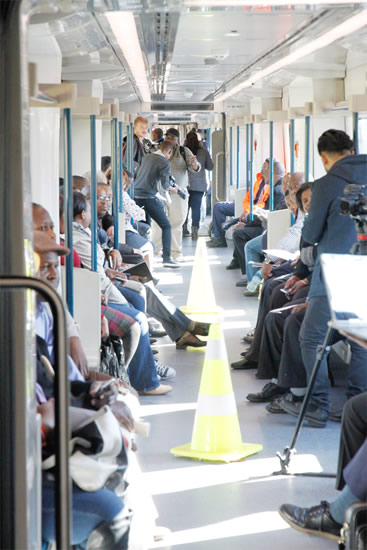
This was announced by Transport Minister Dipuo Peters during a Commuter Imbizo Programme held at Pienaarspoort Sport Ground, in Mamelodi East recently.
“Currently the trains are being tested in preparation for deployment on 1 October 2016. The new trains will ensure safe environment of our passengers with features such as cameras, aircons and heaters, closed gangways, windows that cannot open and electronic doors that are closed before train departure,” said Minister Peters.
The new trains will reduce the travel times to 26 minutes from Mamelodi to Pretoria as compared to a current 47 minutes travel time.
During the visit, the Minister also assessed and monitored the conditions of the services rendered to the commuters, and committed to returning to the area to discuss the Station Modernisation Programme and Fleet Renewal Programme in Tshwane rail corridor.
As part of its Modernisation Programme, PRASA has closed the line between Pretoria Station and Walker Station from 30 April 2016 till 15 September 2016.
This is to install new track slabs, to upgrade track formation of the rail lines, install a proper drainage system and to refurbish the overhead electricity lines and mast foundations.
The value of the contract is approximately R121 million. An additional 10 more stations between Pretoria and Pienaarspoort will also be upgraded.
Commuter Larry Tsokela said that the arrival of the new trains will help the workers and learners to arrive at work and school on time.
We hope that with the new station and new trains, we will finally get services we deserved as commuters,” said Tsokela.
Rail infrastructure gets renewed
Rail infrastructure gets renewed JoyGovernment is investing R51 billion in the New Rolling Stock Programme - and the renewal of rail infrastructure and stations is their main priority.
“We are making notable progress with the implementation of the Pienaasrspoort to Pretoria rail project. We started this particular project with R345 million investment in order to promote rail infrastructure investment along the Pretoria-Pienaarspoort Corridor because it is a corridor, which carries a relatively high number of passengers of around 58 000 per weekday,” said Minister Dipuo Peters.
The minister was speaking during a Commuter Imbizo Programme held at in Mamelodi East recently.
Part of the work embarked on includes the construction of a new Green view station and doubling of the line between Greenview and Eerstefabrieke, as well as improvement of signalling system.
“Construction of the project is in progress…The construction of the station is already 95 percent complete.
“We are also upgrading both Mamelodi and Pienaarspoort stations existing station facilities such as the parking areas and pedestrian drop-off facilities. We are also lengthening the existing platform structure and the replacement of existing sub-standard pedestrian/bridges,” said the Minister.
Acting Group CEO of PRASA, Collins Letsoalo, said that the upgrading of the new train station at Pienaarspoort will include crossing level, pedestrian foot bridge, cross over bridge and fencing to prevent the number of incidents, where people get hit by trains and cable theft.
Lack of security at the station and late arrivals of trains were among the main concerns raised by the community members.
Central Supplier Database attracts 150 000 users
Central Supplier Database attracts 150 000 users JoyNational Treasury’s Central Supplier Database (CSD) has passed the 150 000 mark.
Launched in September last year, the CSD was introduced to simplify the process of doing business with government, as well as making the procurement processes fair, equitable, transparent and competitive.
The system also reduces the carbon footprint for both government and the private sector by moving away from paper by enabling an electronic registration and verification process.
“It also brings about significant cost savings in terms of reduced paper use and less time spent on the procurement process. Suppliers save time as they no longer have to physically deliver documentation as all the relevant information is captured centrally on the CSD,” it said.
Government procurement practitioners also save time in that they can find suppliers in one easily accessible source.
“All organs of state will be required to use suppliers registered on the database. Suppliers therefore only have to register on this singular platform, rather than registering with each organ of state individually,” Treasury said.
The CSD also interfaces with other government systems such as the South African Revenue Service (SARS), the Companies and Intellectual Property Commission (CIPC), the Department of Home Affairs, National Treasury Tender defaulters to verify supplier information and check compliance.
“All organs of state will be required to use suppliers registered on the database.”
This process provides a quick and easily-accessible snapshot of supplier records to government procurement practitioners, to see if a supplier qualifies to do business with government.
Treasury said modernising and streamlining procurement processes through the use of technology will enable government to realise value for money and save R25 billion a year in costs.
“Over the next three years, the public sector will spend approximately R1.5 trillion on goods and services. Centralising supplier records on an online platform will enhance administrative efficiencies.”
Municipalities are scheduled to implement the central supplier database from July 1.
Government has also introduced other measures to modernise procurement systems.
These include the eTender publication portal an online platform through which suppliers can access government tenders free of charge.
Once completely rolled out, tender advertisements in newspapers and government gazettes will be phased out, saving government an estimated R700 million in advertising costs annually.
SA and France boost relations
SA and France boost relations JoyInternational relations
President Zuma concluded his state visit to France, which served to advance relations between the two countries, on a high note.
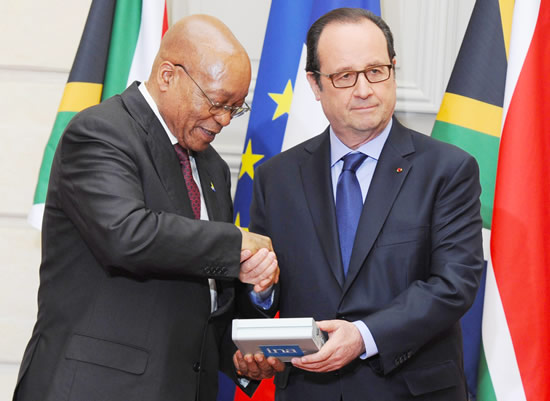 President Zuma held talks with his French counterpart, President François Hollande.
President Zuma held talks with his French counterpart, President François Hollande.
Agreements were signed during the visit to deepen cooperation between the two countries in the fields of energy, agriculture, higher education and training, as well as arts and culture. Both countries welcomed the implementation of the 2015 Alstom Gibela-Prasa contract for the supply of rolling stock, which will create more than 30 000 industrial jobs and stimulate localisation in the field of rail transport.
The two countries also signed the renewed Partnership Framework Document on development cooperation for the period 2016-2019, which makes provision for collaboration in the promotion of national priorities.
President Zuma also met French CEOs and addressed the South Africa-France Business Forum.
In the meeting, President Zuma urged the private sector to explore investment opportunities in South Africa.
Two-way trade currently stands at R33 billion in favour of France. There are about 350 French companies doing business in the country, while only 30 South African businesses are operating in France.
The President also officiated the centenary commemoration of the Battle of Delville Wood in Somme, France, an event that ended 100 years of the marginalisation of black soldiers who died in the First World War. Government has built a memorial in France that recognises all soldiers regardless of race.
The battle at Delville Wood occurred when the South African Brigade was deployed to Somme, an area along the French-Belgium border, in 1916.
The Battle of Delville Wood went down in the history of the First World War as an example of supreme sacrifice and heroism and remained the most costly action the South African Brigade fought on the Western Front.
President Zuma said the centenary commemoration was of special significance to all South Africans.
During the visit President Zuma also received the digitised Rivonia Trial dictabelts from President Hollande.
The deteriorating audio recordings of the 1963-1964 court case were restored by France’s National Audiovisual Institute (INA).
SA, India strengthen trade ties
SA, India strengthen trade ties JoyInternational relations
President Jacob Zuma recently hosted the Indian Prime Minister, Narendra Modi, for talks during the official visit to South Africa.
The Prime Minister’s visit was used to further boost cooperation on economic, political, social and international areas between the two countries.
To date, India is South Africa’s largest trade partner, with trade in 2015 being at almost R95 billion. Trade with India represented 4.9 percent of South African imports and 4.1 percent of exports last year.
Also, there are 82 Indian projects in South Africa, and a total capital expenditure of R62 billion between January 2003 and January 2016, were recorded from 60 companies. India’s leading sectors were software and IT services (17 projects) and financial services (14 projects). India’s investment in South Africa has created an estimated 10 660 jobs.
During the visit South African and Indian businesses signed several memoranda of understanding in sectors such as mining and health, to name a few.
Addressing the media at the Union Buildings in Pretoria, President Zuma said South Africa also regards highly its cooperation with India in the field of skills development.
“A number of our youth study in India. We are keen to explore further opportunities for training opportunities in India as part of youth empowerment and development.
“We have agreed to expand and improve people-to-people contact through promoting tourism between the two countries,” he said.
Ocean economy
India and South Africa, President Zuma said, play an important role in shaping the Indian Ocean Rim Association (IORA) into a vibrant organisation.
“We have identified the ocean economy as a major driver for sustainable economic growth and employment generation under South Africa’s Operation Phakisa: Ocean Economy initiative,” he said.
Prime Minister Modi said India and South Africa have through centuries nurtured strong people-to-people ties.
He said in their joint discussions with President Zuma, they reviewed the full spectrum of their engagement, adding that Indian companies hold strong business interest in South Africa.
He said India had interest in enhancing investment in mining and minerals and pharmaceuticals, among other sectors, in South Africa.
“India is also ready to share its experiences and capacities for development of small and medium businesses in South Africa,” said Prime Minister Modi.
He said the two countries could also partner in the field of defence and security.
Know your Minister
Know your Minister JoyLynne Brown is the Minister of Public Enterprise, a position she has held since May 2014.
About the Minister
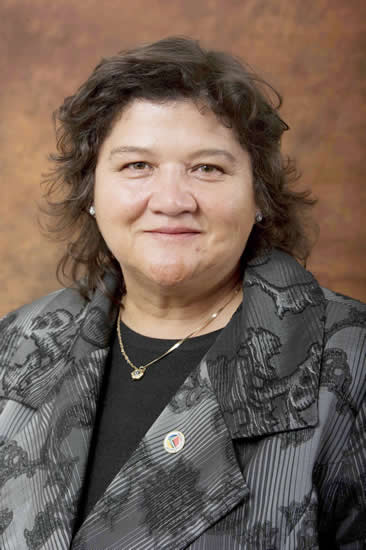 Prior to her current position Minister Lynne Brown served at the Western Cape Provincial Legislature for a period of 20 years. She has served as Premier of the Western Cape Province, a Speaker of the Western Cape Legislature and as Minister of Finance, Economic Development and Tourism.
Prior to her current position Minister Lynne Brown served at the Western Cape Provincial Legislature for a period of 20 years. She has served as Premier of the Western Cape Province, a Speaker of the Western Cape Legislature and as Minister of Finance, Economic Development and Tourism.
A teacher by profession, Minister Brown was active in the struggle against apartheid, with a particular emphasis on women’s issues. She taught at Beaufort West Salt River High and Mitchells Plain and she also taught what was then called ‘night school’ to Grootte Schuur Hospital staff and is a committed supporter of adult education.
She has served as chairperson of the Standing Committee on Community Services, Health and Welfare and on Finance and Public Accounts and was an ANC Chief Whip and Deputy Speaker, as well as the Speaker of the Western Cape Provincial Parliament and a leader of Government Business in the Western Cape.
Minister Brown holds a certificate in Adult and Continuing Education from the University of the Western Cape and obtained a certificate in Gender Development Planning Methodology from the University College in London.
About the Department
The Department of Public Enterprises is the shareholder representative of the South African Government with oversight responsibility for State Owned Companies in key sectors such as Defence, Energy, Forestry, Mining, Transport.
Building national unity
Building national unity JoySport, arts and culture
The Department of Arts and Culture has launched the Braille National Identity Booklet for the visually impaired.
 The launch of the Braille National Identity Booklet is amongst the programmes which are aimed at educating learners and citizens about the National Symbols, encouraging a culture of singing the national anthem at school assembly in all schools as well as inculcating and entrenching a sense of patriotism amongst visually impaired people across racial divides.
The launch of the Braille National Identity Booklet is amongst the programmes which are aimed at educating learners and citizens about the National Symbols, encouraging a culture of singing the national anthem at school assembly in all schools as well as inculcating and entrenching a sense of patriotism amongst visually impaired people across racial divides.
“National Symbols have a unifying role as they present the citizens of each country with the common identity. Symbols can be a statement of intent and a road map in which younger generation of any race can move South Africa forward,” said Deputy Minister Rejoice Mabudafhasi during the launch.
The Braille National Identity Booklet, which was developed by the Lesego Community Foundation, in support of the Department of Arts and Culture, serves as an extension of the department’s flag in every school programme.
The programme is aimed at educating learners and citizens about nation building and social cohesion. The programme includes the promotion of the National Anthem; and the recitation of the Preamble of the Constitution and installation of the National Flag in schools, amongst others.
Get ready for the big walk
Get ready for the big walk JoySport, arts and culture
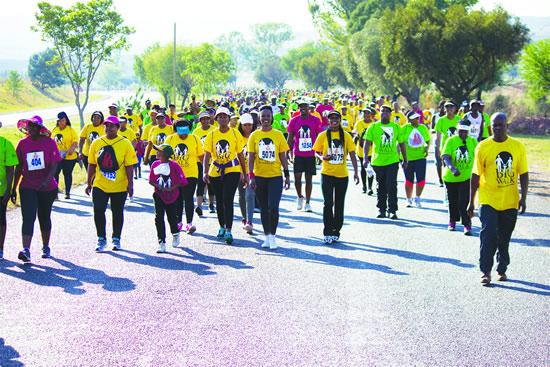 The Big Walk is staged on the first Sunday of October each year, and encourages participation in physical activity. The Big Walk, which is facilitated by the Department of Sport and Recreation, took place in October 2014 to align it with Trim and Fitness International and Sport for All’s (Tafisa) world walking day. Tafisa encourages and lobbies countries to walk by creating advocacy and awareness during October.
The Big Walk is staged on the first Sunday of October each year, and encourages participation in physical activity. The Big Walk, which is facilitated by the Department of Sport and Recreation, took place in October 2014 to align it with Trim and Fitness International and Sport for All’s (Tafisa) world walking day. Tafisa encourages and lobbies countries to walk by creating advocacy and awareness during October.
The event will take place in all nine provinces on 2 October. The main event will take place in Pretoria at the Fountains Valley.
Participants can do the 5 km and the 10km.
For more information on how to take part in the Big Walk visit: www.srsa.gov.za
Proteas to face Australia and New Zealand
Proteas to face Australia and New Zealand JoySport, arts and culture
Following their poor performance in the recent tri-nations series in the Caribbean, the Proteas will want to redeem themselves against Australia and New Zealand.
The national cricket team will play a seven-match series against the two teams, starting with a two test match series followed by a five match series against the old enemy Australia.
New Zealand is in fifth position on the test rankings, one position above South Africa. On the One Day International rankings, Australia is number one with South Africa sitting three ranks below them in fourth place. The games will be played across five different cities namely Durban, Pretoria, Cape Town, Johannesburg and Port Elizabeth.
Durban and Pretoria will host two games each while the other cities will have one game each.
Fixtures (Test series against New Zealand)
Date: 19-23 August 2016
Venue: Kingsmead,Durban
Time: 10:00
Date: 27-31 August 2016
Venue: SuperSport Park, Centurion, Pretoria.
Time: 10:00
Fixtures (One Day International against Australia)
Date: 30 September 2016
Venue: SuperSport Park, Centurion, Pretoria
Time: 14:30
Date: 2 October 2016
Venue: The Wanderers Stadium, Johannesburg
Time: 10:00
Date: 5 October 2016
Venue: Kingsmead, Durban
Time: 14:30
Date: 09 October 2016
Venue: St George’s Park, Port Elizabeth
Time: 10:00
Date: 12 October 2016
Venue: Newlands, Cape Town
Time: 14:30